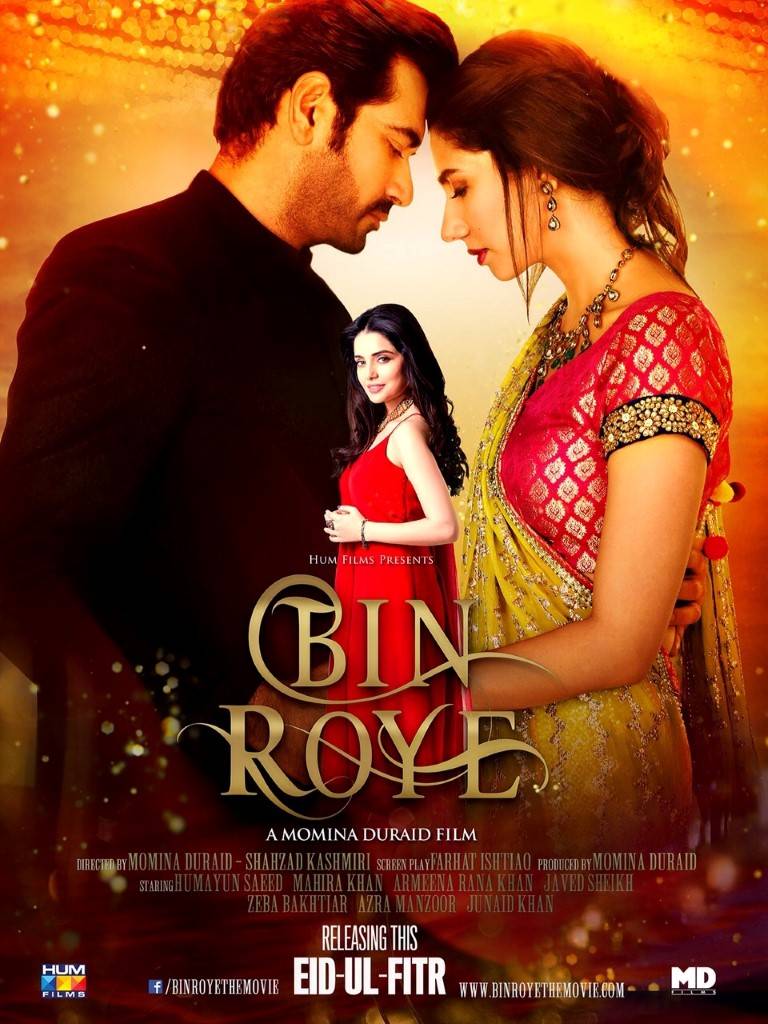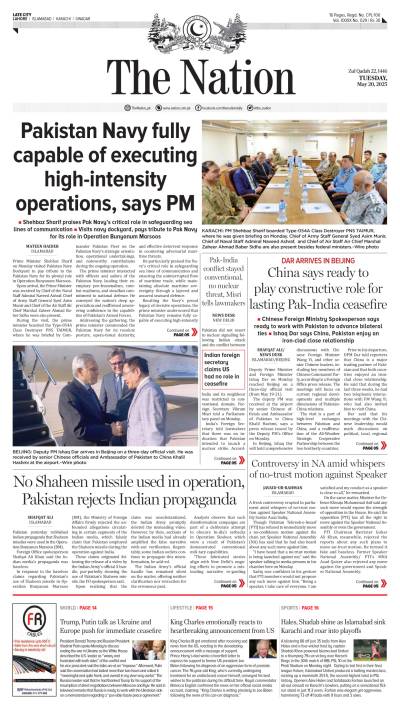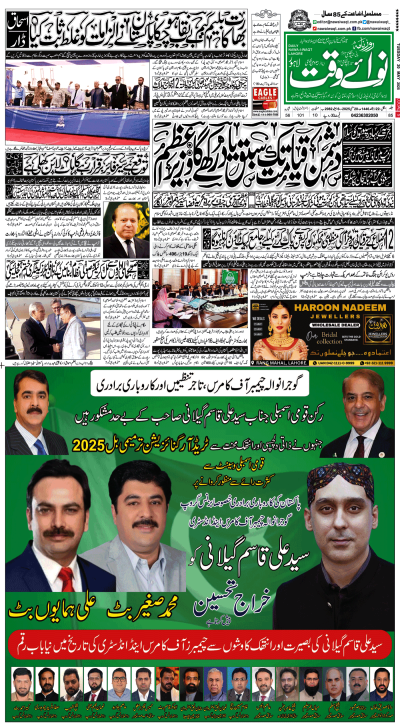Veteran Hollywood director, actor and producer Philip Seymour Hoffman used to say: “The film is made in the editing room. The shooting of the film is about shopping, almost. It's like going to get all the ingredients together, and you've got to make sure before you leave the store that you got all the ingredients. And then you take those ingredients and you can make a good cake – or not.”
But I think Momina Duraid missed some important “ingredients” in her film Bin Roye. Humsafar's famed television director and producer, Duraid's film Bin Roye is not a film in the true sense, rather can be called film-cum-drama, based on the novel “Bin Roye Ansoo” by the popular fiction writer Farhat Ishtiaq who knows how to get the attention of the young minds with simple but tricky stories which have nothing but a ‘larger than life’ life.
Young and formative minds are being impressed by this kind of B-grade literary stuff due to somewhat unrealistic lifestyle which has a little bit of connection with major segments of society.
It is true Duraid, a successful entrepreneur of the entertainment industry, took a risk of making a movie when the cinema of Pakistan is in the "ICU". Cinema’ goers and art lovers surely appreciated her efforts but when you are writing a critical review on a movie or a book, you should be fair in your opinion.
Bin Roye, an impressive and creative title of a romantic drama film, has an attractive cast. Television sensations Humayun Saeed and Mahira Khan played lead roles but the treatment of the film is not cinematic. I am of the firm belief that it is more a long drama than a film.
The Plot
Let’s start with the storyline. Saba (Mahira Khan) and Irtaza (Humayun Saeed) are good friends. Female lead Saba loves Irtaza silently. Then defining moment comes when Irtaza decides to go to United States for two years where he meets Sanam (Armeena Khan) who is in fact a real sister of Saba, who is unaware of this relationship. Sanam knows it but didn’t disclose to anyone.
Irtaza falls in love with Sanam in these two years. Whether it was love or just affection is also not clear.
As a result of an airplane crash, Sanam's foster parents die, therefore, Sanam comes back to live with her family. When Saba knows that Irtaza loves Sanam, she is devastated but doesn't express her feelings. After their wedding, Sanam and Irtaza go back to the United States.
After a couple of years Irtaza, Sanam and their only child Maaz come back to Karachi. One more accident occurs and Sanam dies. Saba feels guilty as she once wishes the death of Sanam.
Maaz now needs a mother but Saba doesn’t want to marry Irtaza for some unexplained reasons. On the other side, Irtaza and Saba's parents wish for them to get married. Saba doesn't agree and accepts someone else’s proposal. But at the eleventh hour Irtaza finds that the guy she is going to marry is already married and the father of a child. Irtaza gets angry and, finally, after an emotional drama his nikkah with Saba is solemnized who is still reluctant for this wedding.
Another defining moment arrives when Irtaza decides to go to the United States. Saba, on the insistence of her grandmother, agrees to accompany Irtaza.
Saba is still emotionally upset and doesn't accept Irtaza as her husband due to her love for Sanam. At this stage, a third accident occurs as a result of which Irtaza is wounded. Saba now feels love for him. She reveals that she has been loving him for 21 years. Irtaza replies he also loves her (Oh Gosh). So the film ends on a happy note and the couple gets united in love.
Critique
The first half of the film has a very slow tempo. Attempt has been made for a lyrical cinema but it is not. Duraid should watch the genre of lyrical cinema. I will suggest her to watch Andrei Tarkovsky’s cult status film "Ivan's Childhood" and Ingmer Bergman's "Persona".
But I am sure Bin Roye has no connection with this genre of cinema and of course it is not a need of the hour.
If Saba was in love with Irtaza for 21 years, why doesn’t she express her feelings to him? Is she facing a psychological disorder? If yes, then the director should need to elaborate her mental condition.
The film then suddenly picks up pace. Irtaza goes to the United States and after a couple of scenes with interactions with Sanam, he is shown having lived two years in the United States. No one even predicts that he has fallen in love with Sanam.
And after the death of Sanam's foster parents, she comes back to live with her original family. When Saba meets Sanam and finds that she is her real sister, the facial expressions of both sisters seem to be artificial. That was the time for the real emotional drama which could enhance interest in the film.
Meanwhile, in just a few meetings, Irtaza and Sanam fall in love. The movie is steadily moving to its end. It is ironical that Irtaza doesn’t tell Saba about his decision to marry Sanam in spite of their long lasting friendship.
Saba learns about their plans to marry when she listens to Irtaza’s acknowledgment of his love for Sanam. There should have been more emotional drama in this sequence, too.
The movie once again gains momentum like "Fast and Furious". The couple gets married and decides to settle in the United States. They have a son, Maaz.
A couple of years have passed but Saba is out of sight. Has she died, committed suicide, admitted to the mental hospital or left the country? Director Duraid and Shehzad Kashmiri have failed to answer these questions cinematically.
And then, once again, a couple of years pass by in a few cinematic moments and the love birds Irtaza and Sanam return home.
Soon, Sanam dies in a road accident (this is the second accident) and Saba dramatically becomes Irtaza’s wife.
Now, the complicated relationship of the couple has been portrayed but the motherless child Maaz disappears till the end of the film.
The couple suddenly goes to United States and an accident becomes a reason to bring them closer and the cinema-goers watch a happy ending.
Is the script or the direction not up to the mark? I carefully suggest that the script is devoid of cinematic elements.
In the cinema a big narrative is explained in a very short time. The sequences should not only be interlinked but also the pace of the film should not unnecessarily jump from one scene to another. Cinematography is somehow good, but it suits a drama and not a film. The same goes for the editing.
Drama, Not Film
Duraid belongs to the drama industry, therefore, the film is more like a drama or a telefilm with visible ingredients of the local drama industry.
Moreover, for the majority of the cinema-goers, the locations or sets are unfamiliar. Even though the third and final accident occurs on a road of Karachi but it still looks artificial.
No local flavours, except costumes, are added in the film.
On the other hand Mahira Khan shows her presence but she is weak in a few emotional scenes. Humayun Saeed's acting is below average; he has an expressionless face while delivering emotional and romantic dialogues. The body language of this veteran actor is also very casual.
And if I may say so, frankly, the film is predictable from start to end.
Zeba Bakhtiar and Javed Sheikh, though, played small roles but left their mark.
I must appreciate the music and the efforts of composers Shiraz Uppal, Sahir Ali Bagga, Shani Arshad and Waqar Ali, singers Shiraz Uppal, Rekha Bhardwaj, Abida Parween, Ankit Tiwari and Rahet Fateh Ali Khan and lyricists Sabir Zafar and Shakeel Sohail. They have done a magnificent job which is without any shadow of doubt has contributed a lot in the success of the film and added a bit of local flavor.
Despite all of my criticism I will suggest the readers to watch the movie to promote cinema culture in Pakistan and appreciate the courage of Duraid for taking the risk of making a film.
I will give Bin Roye 4 out of 10 stars for making our Eid memorable and for Momina Duraid’s efforts to aid the revival of cinema in Pakistan. We are hopeful she will make better films in the future.






